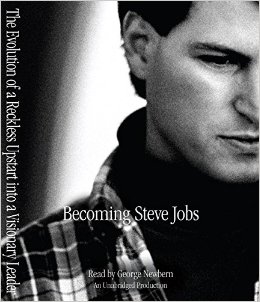Becoming Steve Jobs, book review: The biography Apple's genius really deserves


If you're inclined to disagree, just count the biographies - there must be a dozen, at least. Then there are the 'leadership secrets' books, the guides to his 'hippy capitalist' philosophy and more. Steve Jobs was not just a man - he was, and remains, an industry.
So if you want to learn more about Steve Jobs, where is the best place to start? Specifically, is the latest book on his life, Becoming Steve Jobs: The Evolution of a Reckless Upstart into a Visionary Leader, the place to begin? I think it is.
Until this book, written by Brent Schlender and Rick Tetzeli, came along, the canonical Jobs biography was Walter Isaacson's 2011 'authorised' effort, Steve Jobs. This was hyped by its publishers as a controversial take on Jobs' life. In fact, it turned out to be anything but. Personally, I thought it was worthy and somewhat dry.
Schlender and Tetzeli have written a much more interesting biography, and I think there are a couple of reasons for this. Over 25 years, Schlender worked for the Wall Street Journal and Fortune, while Tetzel worked for Fast Company, the technology, business and design magazine. Schlender interviewed Jobs at various times during those 25 years - including the interregnum, when Jobs left Apple to start NeXT, and after.
As Schlender told the Computer History Museum at an event earlier this month, over time he built a collection of "some 50 tape cassettes of interview with Steve Jobs". These turned out to be a treasure trove: "Often we talked spontaneously over the phone," Schlender told the museum, adding that he had "forgotten just how often we would talk at length".
Schlender first met Jobs when the latter was setting up NeXT in 1988, after being ousted from the company he co-founded. Over the years the two got to know each other well, but before that first interview Schlender, who at that time was working for the Wall Street Journal, had to justify his presence to Jobs, who was not going to waste his time trying to explain technology to a financial journalist who didn't know a bit from a byte.
Schlender passed the test, the interview went ahead, leading to more interviews, and eventually to the book reviewed here.
Setting the record straight
Becoming Steve Jobs is an honest attempt to set the record straight on Jobs.
The authors point out: "In part because of the way Steve quarrelled with [Mike] Markkula and [Mike] Scott, in part because he brazenly asserted his opinions as fact, and in part because over the length of his career, he neglected to share credit for Apple's success in the press, Steve developed a reputation as an egomaniac who wasn't willing to learn from others. It's a fundamental misunderstanding of the man, even during his youngest, brashest and most overbearing years."
"While Steve looked to his elders at Apple for guidance he also sought it out elsewhere."
In a (longish) nutshell, I think that's as neat a summing up of Steve Jobs as you could wish for. Yes, Jobs was misunderstood by many, including many of those close to him, and, yes, he was an extremely complex person. But so, I suspect, are most geniuses - doesn't that go with the territory?
For me, Steve Jobs was summed up by the famous '1984' commercial that ran on US TV in the prime half-time slot at that year's Super Bowl final. I remember it well - not only because at the time I was a big NFL fan, but also because, working for a computer magazine, I had heard that Apple had something big planned for a launch that would coincide with the biggest single sporting event in the US.
In the '1984' advert we saw a young female athlete in full colour, running past serried ranks of monochrome drone-like people to hurl a sledgehammer at a black-and-white screen on which a Big-Brother-like figure was giving a speech. A cover line declared that Apple's forthcoming Macintosh launch event would show "why 1984 won't be like Nineteen Eighty-Four".
No expense had been spared. The advert was directed by Ridley Scott, who worked in advertising before moving on to films such as Alien, Blade Runner, Thelma & Louise, and Gladiator.
This spectacular, unforgettable advertisement would only be shown once on national TV, but in one minute it defined Steve Jobs. It was inspirational, it was creative genius, it was truly brilliant - exactly like the man himself.
Bill Gates could not have put it any better than when he said of Jobs: "I was never in his league." That's some admission from a man like Gates, but it speaks volumes for both men.
In another quote from Schlender and Tetzeli's book, Gates said of Jobs: "It was just amazing to see how precisely he would rehearse. And if he's about to go on stage, and his support people don't have the thing right, you know, he is really, really tough on them. He's even a bit nervous because it's a big performance. But then he's on and it's quite an amazing thing."
And that was the Steve Jobs that those who were lucky enough to encounter him will remember. He had charisma that others, who may have been his equal in fame and fortune, could only dream of. And no matter how unpleasant he might at times choose to be, it was difficult, if not impossible, to dislike the man.
One thing about Steve Jobs that just about everybody can agree on is that the world is a poorer place after his untimely death.
Further Reading:
Pressed for Time, book review: Don't blame the technology
Data and Goliath, book review: A handbook for the information age
Jony Ive, book review: Some genesis, but few revelations
Haunted Empire, book review: Apple's post-Jobs prospects
Insanely Simple: Book review
Book review: What Would Steve Jobs Do?